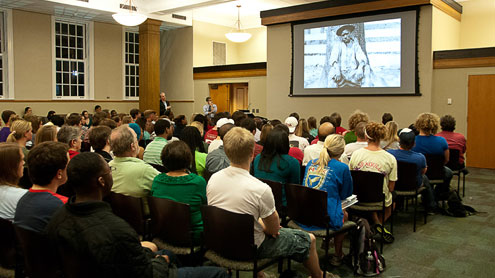Discussing the South’s history can be tricky, especially while in the South, but Pulitzer Prize winner Douglas Blackmon spoke to a full room Thursday night in Gorgas 205 about the history of the post-civil war South and his prize-winning book.
Blackmon’s book, “Slavery by Another Name: The Re-Enslavement of Black Americans from the Civil War to World War II,” focuses on the treatment of African-Americans after the abolishment of slavery in the South and how the system of slavery again manifested itself.
Convict leasing, leasing prisoners to be used as manual labor on farms or coalmines, became common in Alabama after the emancipation of slaves, and Blackmon said this was most often directed at African Americans.
“The South was addicted to slavery,” Blackmon said. “White people obviously knew how to grow cotton but could not resurrect the Southern economy without forced labor.”
Blackmon’s book has also been turned into a documentary, recently aired on PBS. Blackmon played the first three minutes of the documentary for the crowd, which included part of an interview with Sharon Malone, sister of Vivian Malone-Jones, the first African American to graduate from the University.
“From the beginning, I knew there was a possibility of a film,” Blackmon said. “Telling stories today requires using multiple ways at the same time.”
The film can be watched on the PBS website. There are also educational materials that can be used in a classroom setting.
“The documentary is phenomenal,” said Josh Rothman, director of the Summersell Center for the Study of the South. “It’s a little grim but exceptionally well done.”
However, talking about such a sensitive subject in the South does lead to some tension. Blackmon’s book has been banned from the Alabama Prison System.
“I have not been invited to do a lot of sessions in Alabama,” Blackmon said. “Birmingham, in particular, wasn’t interested in my book.”
Since Jan. 1, Blackmon said he has flown over 24,000 miles around the country, speaking about his book and its message. This week concludes his travels, and Blackmon said the University was a great place to end.
“Talking here, I feel like there’s a closing of the circle, in some respects,” Blackmon told the crowd.
During his talk, Blackmon shared personal experiences from his childhood in Mississippi. It was many of these experiences, he said, that interested him in the treatment of African Americans in the South.
“School was very integrated, but the rest of my life remained extremely segregated,” Blackmon said. “It was a crazy world I grew up in, and I wanted to know why it was so crazy. So I started to ask questions – questions that people didn’t really want to answer.”
Blackmon went on from Mississippi to work for The Wall Street Journal from 1995 until recently and is currently a contributing editor at The Washington Post and works with the University of Virginia’s Miller Center of Public Affairs.
After writing a story for The Wall Street Journal about coal mines, Blackmon became interested in how the corporations that used unpaid manual labor in the past fared now.
“I started to write about corporate liability and moral liability, and after the article came out in 2001, there was a big reaction,” Blackmon said. “That’s when I realized this was much bigger than I thought.”
“Historians have known about this for a while,” Rothman said, “but it hasn’t really been researched this extensively.”
Blackmon also discussed how the South chose to react to its past years later.
“It is interesting to compare how different societies wrestled with the terrible things they have done,” Blackmon said. “For us to understand our society today, we must be honest about what has happened in the past.”







